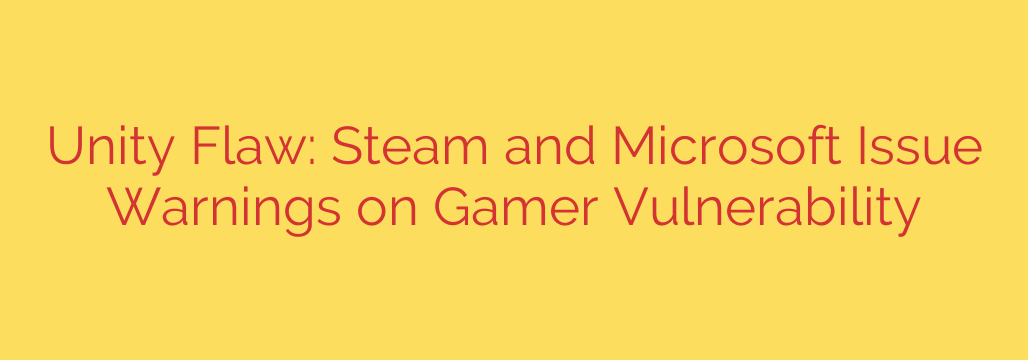
Urgent Security Warning: Major Unity Engine Flaw Leaves Gamers Vulnerable
A significant security vulnerability has been identified in the Unity game engine, a platform used to create thousands of popular PC games. This critical flaw could allow attackers to execute malicious code on a gamer’s computer, potentially leading to data theft, malware installation, or a complete system takeover. The risk is so substantial that major industry players, including Microsoft and Valve (the company behind Steam), have issued alerts regarding the potential danger to the gaming community.
If you play games on your PC, this is a security alert you cannot afford to ignore. Here’s the breakdown of the threat and, most importantly, how to protect yourself.
Understanding the Unity Vulnerability
The security issue stems from the way certain versions of the Unity engine handle specific web links, known as URIs (Uniform Resource Identifiers). In simple terms, attackers can craft a malicious link that, when clicked, exploits a weakness in a game’s code.
Instead of just opening a web page, this specially designed link can trick a vulnerable game running on your system into executing commands it shouldn’t. This type of attack is known as Remote Code Execution (RCE), and it is one of the most severe kinds of security flaws. An RCE vulnerability effectively gives an attacker the keys to your system, all initiated by you clicking a seemingly innocent link shared on a platform like Discord, a forum, or social media.
The core of the problem lies in an insecure implementation of a URI handler within the engine. This means that any game built using an affected version of Unity could potentially be an entry point for an attacker.
Who Is at Risk?
Given Unity’s widespread adoption in the game development world, the number of potentially affected titles is massive. The flaw impacts a wide range of games, from small indie projects to more prominent titles available on platforms like Steam.
This vulnerability potentially affects millions of gamers worldwide. The risk isn’t tied to one specific game but rather the underlying technology used to build it. An attacker doesn’t need to hack the game’s servers; they only need to trick an individual player into clicking a single malicious link.
The involvement of industry giants like Valve and Microsoft underscores the severity of this threat. Their warnings serve as a clear signal to both game developers and players that immediate attention and caution are required. Developers are being urged to patch their games, while users are being advised to be extremely vigilant.
How to Protect Yourself: Actionable Security Measures
While the vulnerability is serious, you are not powerless. By taking proactive steps, you can significantly reduce your risk of falling victim to this exploit.
Here are the essential security tips every PC gamer should follow immediately:
Keep Your Games Updated. This is the single most important action you can take. Game developers are actively releasing patches to fix this vulnerability. Enable automatic updates on Steam and other game launchers to ensure you receive these critical security fixes as soon as they are available. If a game you play hasn’t been updated in a while, consider pausing your play until a patch is confirmed.
Be Extremely Cautious with Links. The attack begins with a malicious link. Treat all unsolicited links as suspicious, especially those shared in gaming communities like Discord, forums, or in-game chats. Be wary of links promising free in-game items, cheats, or exclusive content, as these are common tactics used by attackers.
Verify the Source. Before clicking any link, hover over it to see the destination URL. If it looks strange or uses a protocol you don’t recognize (like
unitydl://), do not click it. Stick to official websites and announcements from game developers.Use Robust Security Software. Ensure you have a reputable antivirus and anti-malware program running and up to date on your PC. While not a foolproof solution for zero-day exploits, it can provide a crucial layer of defense by detecting and blocking malicious payloads if an attack succeeds.
The Bottom Line
The discovery of this Unity engine flaw is a stark reminder that the software we use for entertainment can also be a gateway for security threats. As games become more complex and interconnected, so do the opportunities for exploitation.
Staying vigilant and practicing good digital hygiene is no longer optional—it’s essential. Update your games, scrutinize every link, and stay informed about the latest security threats. By taking these responsible steps, you can continue to enjoy your favorite games while keeping your system and personal data secure.
Source: https://www.bleepingcomputer.com/news/security/steam-and-microsoft-warn-of-unity-flaw-exposing-gamers-to-attacks/








